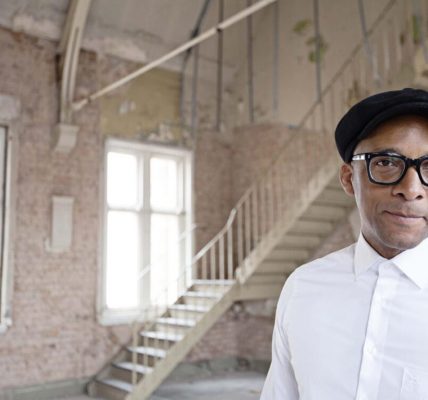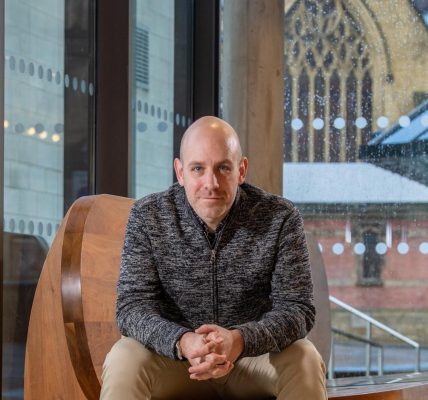Colin Brazier on swapping Sky for Andrew Neil's GB News: "It feels freeing to stop pretending you don't have an opinion"
Colin Brazier on swapping Sky for Andrew Neil's GB News: "It feels freeing to stop pretending you don't have an opinion"
Colin Brazier has jumped ship from Sky to become one of the new faces of Andrew Neil’s much-discussed GB News channel. The USman explains why to Chris Burn.
After months of promotional build-up, high-profile appointments and an attempted advertising boycott before it has begun airing any programmes, Andrew Neil’s GB News channel is just days away from launching what the network’s backers hope – and its opponents fear – will change the landscape of British broadcast journalism forever.
But with final preparations for the launch day – announced today to be on Sunday June 13 – in full swing, one of the channel’s new signings is keen to be honest with viewers about what to expect initially.
Colin Brazier, who has been poached from Sky News to join the GB News line-up which includes the likes of former ITV presenter Alastair Stewart and ex-BBC news anchor Simon McCoy, says: “There is a lot of excitement but things will go wrong. Judge us on the first six months, not the first six minutes.”
GB News intends to be different to the rolling news channels already offered by Sky and the BBC and will instead follow the model employed in America by the likes of the right-wing Fox News and left-wing MSNBC where the schedules are split into individual programmes and are generally driven by opinions about the news rather than straight reporting.
For Bradford-born Brazier, who worked for in the 1990s before landing a job at Sky News in 1997 after spells at BBC Radio Leeds and ITV Calendar, offering his own opinion on the issues of the day will be a major change to what he has been used to in his 24 years at Sky but one he says he is relishing.
“I did feel at Sky that you are wearing a straight-jacket and this is hugely liberating,” says the 53-year-old. “It feels freeing to explore subjects properly and stop pretending that you don’t have an opinion. A lot of people have taken a risk coming to what is a start-up. I’m a widowed father with six kids and I could have quite happily seen out the remainder of my career at Sky. But this was a siren call that had to be answered. I just felt, in common with a lot of people, that existing media outlets are just paying lip-service to wide parts of the country.”
Brazier will co-present a morning show with Mercy Muroki, described by newspaper where she is a columnist as a “proud Conservative who has no truck with ultra wokeism and loathes cancel culture”.
Alongside US broadcasting giant Discovery Inc, the financial backers of GB News include hedge fund manager and Vote Leave donor Sir Paul Marshall as well as the Dubai-based investment group Legatum, which also runs the Legatum Institute thinktank whose chief executive is Conservative peer Baroness Stroud.
Veteran political interviewer Andrew Neil has left the BBC to become chairman of GB News 32 years on from helping Rupert Murdoch launch Sky News. Mr Neil wrote in February that “the direction of news debate in Britain is increasingly woke and out of touch with the majority of its people”, that “our national conversation has become too metropolitan, too southern and too middle-class” and GB News will be aimed at people who currently feel left out, unheard and talked down to by the media.
Campaign group Stop Funding Hate is already calling advertisers to boycott the channel on the grounds it will become a British version of Fox News that will fuel political polarisation in this country in a way that has become well-established in America.
Brazier says attempting a boycott of the channel before it has aired any programming “says more about the people doing it than it does about us”. He says critics portraying GB News as a right-wing talking shop are being unfair with the line-up of presenters including former Labour MP Gloria de Piero.
As for ‘woke’ – originally a way of describing being alert to issues of racial and social injustice but now increasingly used by right-wing politicians and commentators in the pejorative sense that became attached to ‘political correctness’ – Brazier says he is not a fan of the term but admits many of the issues related to it will be a key part of the channel’s focus.
“If you use the word ‘woke’ it essentially hinders a broader conversation,” he says. “But are we worried about cancel culture? Yes. Are we worried about free speech? Yes.”
While the shows on the channel will be opinionated, it will abide by Ofcom rules designed to ensure impartiality in news broadcasting. Brazier says the network is building on what is already being offered by many British radio stations where the opinions of presenters and the public take precedence over reporting breaking stories.
“The model we are building this on is pretty pared back – a cross between talk radio and rolling news. It will be less about breaking news and press conferences and more about the burning questions of the day. Half of the staff are probably ex-radio people. Will we break stories? The answer is yes. Will we do them the way Sky does them with open-ended press conferences and getting on another university professor? No.”
He highlights recent comments made on the changing nature of journalism by Andrew Marr, who said the “biggest single frustration” of working for the BBC was not being able to express his own opinions. Marr said: “I think we are going to go through a period of politics – the next 10 or 20 years – much more turbulent and much more interesting and testing and challenging then anything we have seen in the last 10 years, which have been big enough. I think it will be very, very hard for people like me to carry on being completely neutral and completely sotto voce all the way through that. At some point, I want to get out and use my own voice again.”
While Brazier feels he is moving with the times by joining GB News, his love of journalism began in an old-fashioned way when he was a paper boy.
“I used to do a paper round and I used to deliver and all the papers. It was around the time of the Falklands War and I used to look forward to getting into the newsagents and reaching for the pile of papers to see the latest twist in this unbelievable theatre of conflict. I wasn’t especially clever or particularly gifted and it seemed journalism was a fantastic way of hanging on the coattails of great people and seeing the world.”
He went on to achieve his ambitions and at Sky was the first British journalist to enter Iraq with coalition troops during the 2003 invasion.
“Of the 60 journalists who were embedded with coalition forces, four of them died. Afterwards people thought it wasn’t very much of a war but before we went in people were expecting Saddam to use biological weapons. I did think there is a good chance of me dying.”
Brazier says the all-encompassing life of a war reporter was not for him. While his career has seen him conduct one of the final interviews given by the dictator Muammar Gaddafi and be part of the Sky team that won an International Emmy for its coverage of the European migrant crisis on the Serbian/Hungarian border in 2016, Brazier says his proudest achievements come from family life.
He married fellow journalist Joanna Roughton in 1999 and in 2013, wrote a book about his experiences with their six young children to encourage people to consider having larger families. Tragically, Joanna died from breast cancer in 2018 leaving him as a single father to five girls and one boy, who are now aged between 11 and 22.
“At times it is absolutely crushing and you do feel like giving up. But you can’t. One of the things you get from siblings is they can help you to cope with loss and things like divorce and death. My mum was one of nine and she was widowed 30 years ago and she spends a lot of time with her sisters.”
The practising Catholic says being widowed has changed his perspective on what is important in life. “After going back to work, I would be doing a debate on Sky and sometimes you almost want to stop it and say ‘I know you are really upset about the changing colour of drawing pins or whatever it is but it doesn’t really matter’.”
Fatherhood also helps keep him down-to-earth – exemplified by his children’s generally muted reaction to him joining GB News. “I’m not on TikTok and if it isn’t on TikTok, it doesn’t count,” he laughs.
Colin Brazier recently said the BBC licence fee model is “fundamentally unsustainable” following the Martin Bashir scandal.
He wrote on Twitter: “When I cock up on the telly (and journalism is necessarily imperfect) you – the customer – can take your money elsewhere. When the BBC founders, you can’t.”
But he says today GB News is not intended as a way of adding to the pressure for licence fee reform. “We are in the business of increasing diversity of opinion not closing it down. GB News is creating 120 new jobs in journalism.”
The BBC licence fee will continue in its current form until at least 2027 under the terms of the charter renewal agreed with the Government in 2016.










